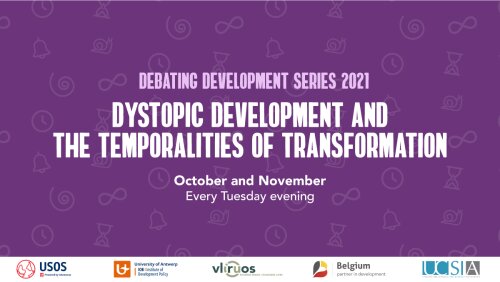
The concept of 'development', as rooted in Western humanism and Enlightenment philosophies of modern progress, is crafted upon a unique understanding of time: a linear conception that separates the past from the present and from the future. Globalized economic production cycles and financialization depend crucially on the predictability and linearity of time to accelerate modern progress. In doing so, time is itself conceived as a measurable commodity aligned with production schedules and expectations of an always-improving world for humanity. Yet, the question of who gets to decide what counts as progress of the human development endeavor in time is itself a political question, fraught with value conflicts over the meaning of time and temporality itself and its importance for understanding the qualitative experiences of what ‘development’ means in practice.
In response, a range of ‘slowness’ movements have emerged to conceptualize time differently, to take back control over the time of both their labour and their lifeworlds, and to offer other forms of clocking strategies to coordinate plural relationships between each other and non-human kin. These reworkings of time offer conscious and unconscious insights into imagining and re-enacting development differently – in ways that both actively redirect systemic inequalities and hegemonic framings rooted in forms of dehumanization and ecological destruction, or have the possibility to do so. Embracing the plurality of temporalities that guide understanding of development thus offers a way to both (re)imagine and actualize different kinds of worlds.
In this series, we will examine plural perspectives on time and temporality as they relate to the notion of ‘development’, including the temporalities of decolonial action, the slow movement, and the role of the academy in relation to slowness. The series will also focus on how slowing down is essential to sustainable food production and for quality healthcare, and explore claims being forwarded by the ‘slow movement’. We end with a panel discussion on how slowness can be a focus for struggles for social justice and for meaningful social engagement.
Programme October - November 2021
- Slowness: a trap or a promise? Understanding time and temporality as relational (Tuesday 12 OCT - 🎞️ watch the webinar)
- Michelle Bastian, senior Lecturer in Environmental Humanities at the University of Edinburgh
- Gert Van Hecken, lecturer at the Institute of Development Policy (IOB), University of Antwerp
- Vijay Kolinjivadi, postdoctoral fellow at the Institute of Development Policy (IOB), University of Antwerp
- Slowness from a food sovereignty perspective (Tuesday 19 OCT - 🎞️ watch the webinar)
- Geneviève Savigny, farmer and a representative of the European Coordination Via Campesina
- Max Ajl, postdoctoral fellow at the Rural Sociology Group, Wageningen University
- Danya Nadar, PhD candidate at the Institute of Development Policy (IOB), University of Antwerp
- Geneviève Savigny, farmer and a representative of the European Coordination Via Campesina
- Slowness and knowledge production - towards a slow academia? (Tuesday 26 OCT - 🎞️ watch the webinar)
- Filip Vostal, senior researcher at the Institute of Philosophy of the Czech Academy of Sciences
- Valerie De Craene, researcher at VUB, guest professor at Ghent University, member of Slow Science in Belgium
- Postcolonial and decolonial dialogues from the slow movement vantage point (Monday 8 NOV - no recording available)
- Elaine Gan, artist-theorist at New York University, Center for Experimental Humanities and Social Engagement
- Francine Rossone de Paula, lecturer in International Relations at Queen’s university
- Slowing medicine and the Covid-19 crisis (Tuesday 16 NOV - no recording available)
- Julie Levingston, medical historian at New York University
- Magalie Schotte, coordinator of the Be-cause health platform at the Institute of Tropical Medicine Antwerp
- The possibilities of transnational activism: the slow movement in context (Tuesday 23 NOV - 7 to 9 pm - in person event at Stadscampus University of Antwerp - R.002, in collaboration with the University Centre Saint Ignatius Antwerpno recording available )
- Thomas Davies, senior lecturer in International Politics, City University of London
- Civil society representatives:
- Allforclimate, Citizen Spring (Leen Schelfhout)
- Kahina Rabahi, social justice policy expert
- Fashion Revolution (Ellen Haverhals)